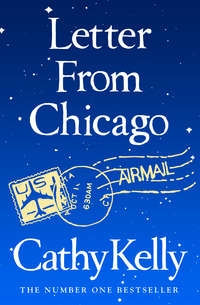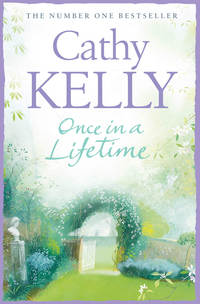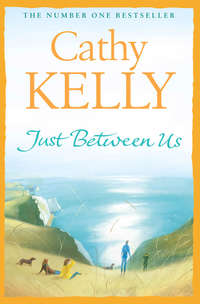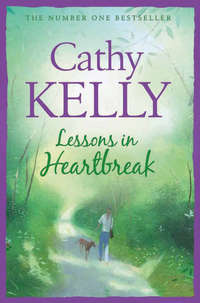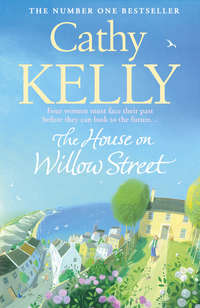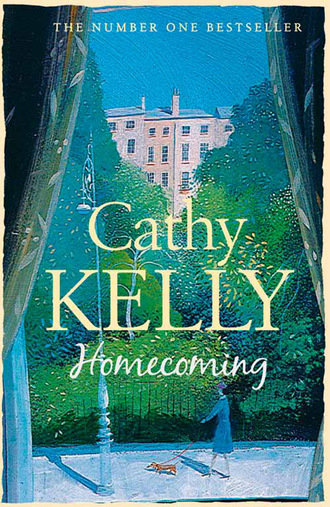
Полная версия
Homecoming
Eleanor wondered where Susannah was now. They’d lost touch around about the time Eleanor and Ralf got married. Susannah went off to live in Switzerland to work at a university there. Eleanor pictured her: still tall, eccentric and in love with people she saw only on cinema screens.
A gust of wind made the branch of the rowan tree outside the window bang against Eleanor’s window. The tiny scarlet berries on the holly bushes beneath it were all gone now. Sometimes a lone robin sat on the tree and look quizzically at Eleanor, as if asking for food.
Eleanor smiled sympathetically at him but she wasn’t able any more to hang seed balls outside. That took dexterity and suppleness, things she no longer had.
There were many things she no longer had. Her beloved Ralf being the most important. No one needed her now. Her family back in New York loved her, but they had their own lives. Naomi and her devoted husband, Marcus, were busy with their furniture import business. Filan’s Furniture was much in demand and, despite the credit crunch, they were expanding.
Gillian, Eleanor’s adored grand-daughter, had settled into her second year at UCLA and had thrown herself madly into her new life there.
They would manage without her. She was too broken, too wild with grief to be a proper mother or grandmother any more. Worse, in her present grieving state, she might be a burden.
It was an odd feeling. All her life, Eleanor had worked and strived, both for her family and in her professional life. She solved problems, she didn’t create them.
In an instant of loss, all that had changed. She had changed.
Which was why she’d turned her back on New York and returned to Ireland. Here she might find the answer, find out what she had to do. She hoped so with all her heart.
2 Eggs
Being able to boil an egg means you’ll never go hungry. Duck eggs make the most wonderful breakfasts. When you crack open the fragile shell and peer into that golden yolk, the colour and consistency of honey, and breathe in the scent of the land, your heart sings.
The problem is the ducks. We always had a couple in the yard, Muscovy ducks, with black and white feathers and red bills, and Lord, those birds could fight. They were like a warring family. In the end, I kept them in separate pens in the coop. It was the only way.
Some people are like that too, by the way. No matter what you do, they’ll fight. That’s their business, love. You can’t stop them fighting. Might as well let them at it, but don’t get involved.
You might wonder why I’m telling you this, Eleanor, but you see, I don’t want you to grow up without learning all these things, the way I did. It wasn’t my mother’s fault, mind. It was mine. I was a sickly child, although you wouldn’t think it to look at me now. As I sit at the table with my writing paper, I’m a few months shy of my twenty-sixth birthday and I’ve never felt better. But as a little one, I spent a lot of time in bed with fevers and coughs. My mother dosed me with a drink made of carragheen moss and lemon juice. A weak chest, was what the doctor said, although we didn’t go in much for doctoring. They were hard years, then, at the start of the century and there wasn’t money for doctors for the likes of us.
My mother once took me to visit an old man who lived way over the other side of one of the islands, to a house on the edge of the cliff, because he had the curefor a bad chest. Someone said his cure was mare’s milk and some herbs and a bit of the mare’s tail – it had to be a white mare, mind you – but whatever, it didn’t work on me.
The long and the short of it is that I didn’t learn how to cook alongside my mother. Most girls learned from watching their mother at the fire. I was wrapped up in the bed in the back room with only a few books for company. Agnes brought home books from Mrs Fitzmaurice’s house, and I read them all: Jane Eyre, Wuthering Heights, Tom Jones, even.
And then one day I just grew out of the bad chest. My mother wanted me to go to school because I’d been there so rarely. Again, I had my head in the books and never so much as peeled an onion. Then Mam became ill and suddenly I was the woman of the house. Agnes was gone all week and back on Sundays, the lads were out working on the land, and the only person left to cook and clean was the one person who didn’t know how to do any of it.
But I learned, Eleanor, I learned. The hard way, I might add.
That’s what I want to tell you. About the joy of cooking and feeding the people you love. About the skill of making dinner for ten from a few scraps. There’s magic in cooking. It’s like prayer, you know. All those heads bent, hearts joined together. That’s why it works. It’s because of people coming together. Cooking’s the same.
The man in seat 3C sneaked a look at the young woman sitting beside him on the Heathrow to Dublin plane. She was small, fine-boned and wearing one of those funny scarves wound around her head, the way old ladies used to wear turbans years ago. He couldn’t understand it himself. Why would a pretty girl do that to herself, like she wanted to look ridiculous? A bit of blonde hair had escaped the scarf: it was old-style blonde, platinum, actually. Otherwise, she was very un-done-up, as his wife might say. No make-up, wearing jeans, a grey marl sweatshirt and trendy rectangular glasses. Yet despite all that, there was something special about her. Something he couldn’t quite put his finger on.
‘Are you eating with us today?’ asked an airline steward. The male passenger looked up.
The steward was definitely talking to him but his eyes were on the woman in the window seat, consuming her, as if he hadn’t had a good look yet and wanted his fill.
‘Er, yes,’ said the passenger. He liked airline food, couldn’t understand why other people didn’t. Food was food. ‘What is it?’
‘Choice of beef stew or chicken with pasta,’ said the steward, deftly putting a tray down on the man’s fold-out table.
‘Beef,’ said Liam, thinking he might as well eat a proper meal as it would be at least nine before he got home.
‘Anything to drink?’ the steward murmured as he set a small tinfoil-covered package on the tray.
‘Red wine.’ Liam unveiled his dinner with anticipation. It was pasta.
‘Sorry,’ he said to the steward, ‘I wanted beef.’
But the steward had already put a small bottle of red wine on his tray and his gaze was now fixed on the girl in 3A.
‘I wanted beef?’ said Liam plaintively, but it was no good. The caravan had moved on.
Megan knew the cabin crew had worked out who she was, even though she always flew under her real name, which was Megan Flynn, and not Megan Bouchier, the name the world knew her by. Bouchier was her paternal grandmother’s family name, and all those years ago at stage school she’d seen the sense of dropping the prosaic Flynn in favour of the more memorable Bouchier.
She’d hoped the Flynn would give her some protection now, along with the blue silk scarf hiding her trademark platinum curls and the little Prada glasses with clear lenses, but it hadn’t worked.
When you’d spent the best part of six years appearing on television and cinema screens, and in magazines and newspapers, your face burned on to people’s minds the way the FBI’s Ten Most Wanted list never seemed to do. Murderers and master criminals might go unrecognised, but land a starring role in a series of mediocre television shows and one standout British movie, and your face suddenly became as recognisable as the queen’s.
The dinner trolley was locked beside her row and at least three members of the crew were looking at her while pretending not to look at her, which was a difficult trick to pull off. Airline staff were good at that: charmingly treating world-famous people with polite nonchalance.
Today’s crew were reacting to her differently, though. Perhaps it was because she was no longer the adored young actress who’d been listed in Empire magazine as one of the ‘ten most promising actors of the year’ not that long ago. Instead she was the marriage-breaker pictured on the pages of every redtop in London alongside a photo of another actress, an older woman whose husband Megan was accused of stealing.
Megan had not wanted to see the papers when the story had broken. She’d tried not to look but she couldn’t avoid the headline that jumped out at her from a newsstand outside a Tube station.
‘Devastated!’ it screamed above a picture of Katharine Hartnell, her famous, Oscar-winning face drawn, cheekbones prominent, dark circles under her eyes. Apart from her Oscar, Katharine Hartnell had been famous for being fifty but not looking it. And she was famous for being in love with her movie-star husband after twenty years of marriage – light years in movie-star terms. Megan had seen many photos in magazines of Katharine and her husband looking very much in love. In the newspaper picture, she looked more than fifty and definitely devastated.
‘The other woman,’ was Megan’s caption, with a picture of herself she hated, showing her emerging, laughing, from a night club, her long hair askew, someone else’s fur coat thrown over her shoulders and a man on each side, one waving a bottle of champagne. She was wearing a silver sequinned dress that had sunk further down her cleavage as the night had gone on and by the time the photographer – who must have made a fortune from that one picture – had snapped her, the neckline was millimetres away from her left nipple.
The small, heart-shaped face that numerous photographers had described as ‘exquisite’ was creased up into a huge tipsy smile and her almond-shaped eyes, the kohl smudged, glittered with the excitement of being the ‘it’ actress of the day. All in all, the photo was like a dictionary illustration of the word hedonism.
The story and that iconic picture meant Megan had entered the terrible world of the media’s ‘most hated woman on the planet’. Suddenly, people she’d never met talked about her over their skinny lattes and their newspapers, condemning her as a husband-stealer. Opinion articles were written on whether women like her put the cause of feminism back thirty years.
Megan had grown used to being loved, to having designers sending her handbags, to having magazines print admiring articles under photos of her gracing the latest premiere.
And now this. Megan the Mantrapper.
She’d fallen from grace faster than any archangel and the result was cold, hard hatred. Where once she’d been loved, now she was loathed. It was incredibly painful. Almost as painful as having her heart broken.
‘Would you like dinner? A drink?’ said the steward. Somebody else’s husband? were the unspoken words Megan heard.
‘No thank you,’ she said with all the dignity she could muster. She’d have liked a bottle of water but couldn’t face the actual transaction, having to look at the cabin crew and see what was written on their faces: pity, contempt, abject fascination. Instead, she turned to look out the window as if there was something to be seen out there instead of cloudy darkness.
Her sister Pippa had told her that escaping to Ireland was a good plan, and she trusted Pippa with her life. Once upon a time, Pippa might have run away with her but now her running-away days were over: she was the mother of two small children, with a real life in Wales and a husband. Megan would have gone to stay with them, but the press had already been sniffing around their home, making a nuisance of themselves. Besides, it wasn’t Pippa’s job to protect her little sister any more. That hurt too.
‘Megan, love, you’ve got to get out of London,’ Pippa had urged her. Megan’s agent had been saying the same thing, but with much less kindness.
Carole Baird was not one of the ‘tell them they’re fabulous, no matter what’ agents. Her motto was ‘tell them like it is – with knobs on’. Megan’s behaviour might lose her film roles and impact on her career – and therefore, on Carole’s bottom line. Twenty per cent of nothing was nothing. Carole’s concern wasn’t moral, it was financial.
‘You should go to Aunt Nora’s – Kim!’ Pippa shouted. ‘Put that down! Sorry, Megan, she’s at the dishwasher again. We just made a cake and she wants to lick the bowl and spoon again. No, Kim. Dirty, no!’
Aunt Nora’s home in Dublin was where the sisters had spent the normal part of their childhood years. As different from their mother as chalk was from cheese, Aunt Nora had toned down all Marguerite’s wilder suggestions when the girls were growing up. Aunt Nora said that the French school on the Caribbean island where Marguerite was living at the time probably wasn’t the best place for two kids who didn’t have much education behind them, and couldn’t speak French. Aunt Nora enrolled them in the Sacred Heart Convent just off Golden Square and took care of them until Marguerite’s latest love affair had gone sour and she went back to London.
Aunt Nora had always been there. Solid, dependable, as unstarry a person as you could find.
Which was why Megan didn’t want to have to talk to her about what had happened. Her mother hadn’t judged Megan because she didn’t know what judgement was. Marguerite had made too many disastrous romantic choices in her life to comment on anyone else’s, but Nora – a single woman who went to weekly Mass – might.
‘What about Australia?’ Megan had wondered when she’d spoken to Carole. It seemed far enough away to hide from the photographers who had been camped outside her flat in London for the past ten days.
‘You need family,’ her agent said sagely.
I’d be out of your control in Australia, Megan thought grimly.
‘Who knows what you’d get up to in Australia,’ Carole said, on cue. ‘Too many gorgeous men.’
Megan had to laugh, although it was one of those painful laughs. ‘You don’t trust me,’ she said.
‘Why should I?’ said Carole. ‘You’re screwing up your career and mine too. Let’s put all the cards on the table, Megan. It’s not doing the agency any good being linked to someone who’s wrecking her career so successfully. People are wondering why I didn’t stop it. As if I damn well knew about it. You’re not a pop star. People practically expect that from music industry stars, but it’s not good if you’re trying to make a name for yourself as a serious actress. Nobody’s going to cast an actress who’s just broken up what’s been held up as one of the rare long-lasting Hollywood marriages. Producers and directors want a reasonably blank canvas or at least someone who can play innocent – what they don’t want is a PR nightmare. All moviegoers will see now on the screen is Megan the homewrecker. This stunt has thrown away years of hard work. I’m not sure what you can do to ride out the storm, but you need to keep your head down for at least six months. And I mean down. No partying, no going to fashion shows and getting papped having fun. You need to look sorry.’
‘I am sorry,’ Megan said bitterly.
‘Nobody wants to hear empty words, Megan,’ Carole said. ‘Only an idiot would say they weren’t sorry. Sorry isn’t the issue. People want your head on a platter. That’s the downside of fame. The public get to give it and they get to take it away.’
Megan stilled. For a few moments, she’d considered telling Carole what she really felt. That she’d loved Rob Hartnell. That she’d never have gone with him otherwise. Now she was glad she hadn’t.
Carole had a very simple view of the whole episode: Megan had had a badly judged fling with a happily married movie star. They’d been caught and instead of the movie star standing by Megan’s side, he’d run away. Three lives were wrecked, the sympathy was with Katharine, and Megan was portrayed as a femme fatale who’d chiselled Rob away from his wife.
Rob, very sensibly, had not hung about for the fall-out. He had simply disappeared, the way only the very famous or the very rich can disappear. Since that day in Prague – was it only just before Christmas? – when a photographer had caught Rob and Megan cuddling up in a tiny bar near their hotel, Rob Hartnell hadn’t been seen. Megan was left to face the storm alone. ‘I’m devastated, too,’ she wanted to cry. But it was no use. No one, not even her agent, cared what she felt.
‘The whole thing is career suicide,’ Carole said, almost to herself. ‘What were you thinking?’
Megan felt the rawness inside her and was glad she’d kept her feelings to herself. Thinking had had nothing do to with it, but it was better that Carole didn’t know that. She would rather no one knew it. Public hatred might be painful, but it was marginally better than pity.
‘Time is the only healer now, at least in the media,’ Carole went on.
And what about my heart, how is that meant to heal? Megan thought, but instead she said, ‘If my sister can’t have me, I could go to my Aunt Nora’s in Dublin.’
Nobody would expect her to go there when she had many jet-setting friends with yachts and islands and Manhattan apartments, although the friends seemed to have made themselves scarce. Katharine Hartnell was too powerful for anyone in the industry to risk offending. Only a few of the people Megan had thought of as friends were phoning up now, and more for prurience’ sake than out of friendship.
Still, Ireland was the last place anybody would expect her to go.
It was also the last place she wanted to go. Aunt Nora would not throw her arms around Megan and say ‘poor diddums’. She’d probably ask ‘What the heck were you doing?’
But it was a home, and one the press were unlikely to know about. Her peripatetic childhood on exotic islands had been widely reported; interviewers had always been much more interested in her recollections of Martinique and Formentera than Dublin Bay.
Ireland and Aunt Nora would do, but really she wanted to hide with Pippa: lie on the bed in her big sister’s attic spare room reading novels, hidden from prying telephoto lenses by rolling Welsh hills. But she couldn’t compromise Pippa’s family in that way.
When they’d been younger, the gorgeous Flynn sisters had set London, and occasionally LA, on fire. It seemed nothing could stop them. But that, like everything else, had changed. Now Pippa had taken herself out of the rat race and, much as she loved her sister, she had other loyalties to consider.
A couple of days earlier, on one of her sneaked forays from the London flat to get groceries, Megan had treated herself to a fashion magazine – one which had featured her in their ‘in the closet’ series a year ago. She’d opened it to find a big article by a leading female journalist on the evils of predatory women, and there she was, Megan Bouchier, vilified as the worst offender. Horrified, she’d thrown the magazine in the bin, but it carried on taunting her, even from underneath the wet teabags.
‘Who are these people who hate me so much?’ Megan had sobbed on the phone to Pippa. ‘It’s cruel, the stuff these newspaper columnists write – the women are the worst. How can they be so vicious?’
For once, there was quiet from Pippa’s end. Normally, their calls would be punctuated by an endless chorus of ‘Mummy, I want…’ or the dogs barking or someone laughing or crying – Megan had become used, although it had been hard initially, to the constant demands of her sister’s life. Kim, four, and Toby, twenty months, came first now.
‘I don’t know,’ Pippa said after a while. She sounded as if she was too tired to even answer the question at the end of a long day chasing after her small children. ‘I suppose it’s like the pack instinct, isn’t it? Women feel threatened and blame the other woman. It’s easier to see her as the snake charmer, the evil seductress, than to blame your own man for straying. You know, it’s not his fault, therefore you can still trust him. It’s other women you can’t trust.’
It was Megan’s turn to be silent. When the news had first broken, Pippa had been her greatest ally. ‘He seduced you, he told you their marriage was over, it’s his fault,’ she’d said back then.
Even when the press had arrived at Pippa’s farmhouse, scaring the chickens so much that two had run off and never returned, she’d been on Megan’s side. Now suddenly she wasn’t. She was fed up with it all and the effect it was having on her life. Attuned to every nuance of Pippa’s voice, Megan could tell that her sister had had enough of the Rob and Megan saga.
Worse, Pippa was looking at the story from a distance, thinking about how other women would view her beloved sister, instead of standing beside her in the trenches.
It was hard to know what was the most painful: Rob vanishing, her subsequent crucifixion in the press, or the knowledge that the whole scandal had somehow severed her bond with her older sister.
How, Megan thought bleakly, could a love so glorious have brought such pain?
She could see the lights of the curving arms of Dublin Bay through the plane window. Her throat felt tight at the sight. Home. It was home in lots of ways. Since their father had died when Megan was ten and Pippa thirteen, they’d lived in many different houses with their free-spirited mother. Sometimes the houses of their mother’s boyfriends, sometimes houses they rented. The one in Peckham was the one they’d lived in the longest, and that had been for two years, when Megan was starting out acting. She’d done her best never to say where she lived. Peckham didn’t sound cool enough. There had been an awful problem with damp. It was a three-bedroomed house and each bedroom reeked of damp. Pippa had had to throw out her favourite brown leather jacket because of the mould on it.
Nora’s house in Golden Square was the only home which had remained constant in all that time. Not as fancy as the villa in Martinique, or as cool as the top-floor apartment in Madrid, which had only lasted six months anyhow, because Pablo had been a bit of a perv and had clearly fancied both Marguerite’s daughters, so they’d left there sharpish.
Golden Square wasn’t cosmopolitan, smart or trendy. It had seemed like the most boring place on the planet to fourteen-year-old Megan in the two years she’d lived there and attended the Sacred Heart Convent. The only reasonable shops in the area were the book shop and the vintage clothes shop, Mesopotamia, where Megan had once found a tattered Pucci scarf for a fiver. Granted, a lot of the clothes there were tragic, but if you rummaged, you could get bargains.
Golden Square was both homely and home. Everybody knew Aunt Nora and liked her, respected her. If Nora forgot her purse when she went to The Nook convenience store, the owner would happily wave her away and tell her to pay another time. Megan couldn’t think of anywhere in the world where she knew people in the same way.
The plane banked over the city, lower all the time. Like Megan’s spirits.
It was horrible, feeling that she’d entirely messed up her life almost before it had begun. She had wanted to do everything right, to be the best she could be, to be wise and kind, and yet somehow she’d ended up in a world where it was easier to go to night clubs ‘til dawn, easier to hang around as part of some rock star’s entourage, easier to do the wrong thing. And all the while it was as if her life was a film; she was just playing a role, just pretending she was real. It felt as though none of her choices actually meant anything because tomorrow she’d wake up and be a different character.
Except it wasn’t a film and the choices she’d made had been real. So were the consequences.
Overnight her fairytale world had turned very real and very ugly.
She didn’t know whether Nora or the comfort of Golden Square would solve any of that. All she knew was that she would give anything to be able to go back and start again.
Nora Flynn saw the last client off the premises and locked the practice door with relief. The heavy curtain she pulled over the door was a sign to regulars that Golden Square Chiropody Clinic was closed for the day. It had been a long one; seven clients ending with a very difficult woman at six who wanted something done about a fungal nail infection but did it mean her nail polish would have to come off?


